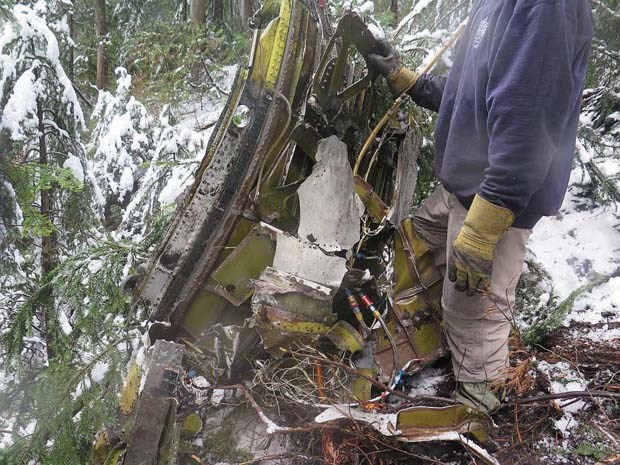The captain flying the small cargo plane that crashed in the North Shore Mountains in April was drunk at the time, according to toxicology results released by the BC Coroners Service.
Robert Brandt, 34, had a blood/alcohol level of .24 — three times higher than what would result in criminal charges for a driver on the road. Co-pilot Kevin Wang, who was also killed in the crash, had no drugs or alcohol in his system.
“It gives us a big piece of information to work with with regard to the pilot’s performance. In determining the cause, this is one piece of an equation. If there are other things found that complicate it, we have to put that in our analysis,” said Bill Yearwood, Transportation Safety Board spokesman.
Carson Air flight 66 took off from Vancouver International Airport around 7 a.m. on April 13 with a load of banking documents bound for Prince George. The twin engine Swearingen Merlin III plane disappeared from radar about five kilometres north of Mount Seymour roughly 10 minutes later. There was no emergency distress call from the pilot and the plane had no cockpit voice or data recording systems.
North Shore Rescue volunteers found the wreckage near Coliseum Mountain later that evening and helped recover the bodies the next day.
The coroner carries out toxicology tests on all pilots as a matter of course. The coroner decided to release the information this week as rumours about the crash were beginning to spread.
The crash remains under investigation by the Transportation Safety Board. The final report, including recommendations for how such accidents can be avoided in the future is still several months from completion.
At the time, investigators said the plane plummeted from an altitude of 2,400 metres to about 900 metres — the height at which the wreckage was found — in less than 20 seconds.
“What we know is that the aircraft broke apart in-flight. That didn’t necessarily indicate mechanical problems. It certainly could be one of the reasons for it, but we know that the aircraft had descended very rapidly and the break-up is consistent with an aircraft that was descending quite rapidly,” Yearwood said.
Though he did not have an exact number, Yearwood said plane crashes where intoxication is a factor are rare.
Pilots are expected to ground themselves if they are unfit to fly in any way, Yearwood said. That could be due to health issues, stress or any level of intoxication. Unofficially, pilots like to say “eight hours, bottle to throttle.”
“That’s a common rule, but it doesn’t mean that if you give it eight hours and you’re still intoxicated, you can go flying,” Yearwood said.
Carson Air has not yet responded to a request for comment. The company has no previous crashes or investigations.



